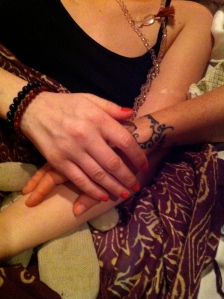I heard an excellent story on NPR the other day, about How Doctors Die, and how even though the majority of people in the U.S. say they want to die at home, surrounded by loved ones, less than half do and most die in the Intensive Care Unit (ICU). In Tucson, where I’ve lived the past 8 years, only 10% die at home. This is partly because when we are very sick, doctors are not likely to tell us the whole story, and we are not willing to ask the important questions – what are the implications of this treatment, what will be the quality of my life, how much time might this treatment add to my life, what are the risks and benefits…?
it reminded me of how difficult it was for the doctors to tell us what was really happening when Elizabeth was in the ICU. She’d had 2 chemo treatments when the lymphoma had spread to her brain, that had not shrunk the tumor. She’d had brain surgery to “debulk” the tumor, which had reduced the size of one tumor, though now we learned there were two in her brain, and probably more in her spine. The surgery had increased the swelling in her brain, necessitating a 2nd surgery to remove part of her skull, and then a stroke left her paralyzed except for her right arm and head. She was intubated, meaning she couldn’t speak, and it was so painful that she tried to pull the breathing tube out if her hands were free.
Elizabeth had told me clearly when going through her first chemo treatments: “Mom, I don’t want to go through years of treatment for cancer only to die of it. I don’t want to live like that.” I looked at her and I said “you won’t”, knowing somehow, that it was true, she would not.
But the doctors were still coming to the ICU each day and telling us she could go to rehab, learn to walk again, she’d need radiation to her brain, a different chemo drug…and I was a believer still, not yet seeing what was in front of me. Powerless, and still hopeful. Around the 6th night she was in the ICU, in the hallway, our favorite nurse said to me “I heard from your friend that you’re starting to talk about hospice.” I was shocked. That was the first time I’d heard the word used in relation to Elizabeth, and we had NOT started to talk about hospice! I was angry at her, felt violated and that she’d crossed some line. Only later was I incredibly grateful for the one brave woman who would dare speak the truth.
The next morning, after some time had allowed this idea to sink in, I asked the oncology team to tell us what was realistic. Did hospice make more sense than planning to continue treatment? Only then, when confronted, did they say yes, hospice was probably the way to go, that the treatments being discussed weren’t likely to be successful. They also passed it off to Elizabeth’s specialist, who had never come to the hospital, saying he’d have to talk to us for the final word. He came that day I think, and sat with me and Greg, and told us that she could try more chemo, or radiation, but it would likely only add days or weeks to her life and he didn’t recommend further treatment. There was no question in my mind that Elizabeth wouldn’t want that, and I didn’t want that for her either. All I wanted then was for her to come home, be out of the ICU, in a beautiful, peaceful place where we could care for her ourselves. Dr Miller also told us that if he let himself, he’d be sobbing along with us, but he couldn’t. That he wanted to be the hero who saved her, and he hated that this wasn’t the way the story was going to end. I know he didn’t want to be there either, having this conversation. No one wants to be the one to tell the parents of a 22 year old young woman that she will die soon.
We still had to fight hard to get her breathing tube removed, as she had a hard time passing their breathing test, though she was breathing on her own. The ICU doctor was afraid they’d have to intubate her again, if she didn’t have the strength to continue on her own. I knew she’d be fine, that she needed to get the breathing tube out, so we could take her home.

Finally, after days of promises and disappointments, they removed the tubes (partially because her dad had a rare, but necessary, blowup at the ICU doctor). She breathed fine, and she could speak again! I then told Elizabeth what Dr Miller had said, that there were no more treatments to try and she could come home. She looked at me and said, “I’m relieved.” I looked in her eyes and said, “I understand.” Elizabeth said, “I’m so glad you understand! I was afraid you wouldn’t.” I told her of course I understood, that she had done everything she could possibly do, and I just wanted her to come home where I could take care of her, and she wanted that too.
She’d had a feeding tube in, and as soon as her hands were free, she tried to pull it out. I explained that she might not be able to eat, as we didn’t know if she could swallow still, and asked if she understood what that meant. The doctors advised against it. She said yes, she wanted it out, and got it most of the way before a nurse could help her. Once that was done, and she wasn’t attached to the machines, we arranged quickly with hospice for a bed to be delivered to our home, and she came home the next day, after 10 days in the ICU.

If that nurse hadn’t spoken up, if we had been compliant and unquestioning, if we didn’t have great family support, a friend who is a doctor…Elizabeth might well have lived her last weeks in the ICU, hooked up to LOUD, painful, machines, with ICU psychosis (an actual condition they acknowledge there) from bright lights 24 hours a day, nurses waking her up every few hours, not able to speak, eat, laugh or just be.

As it happened, she came home and lived two more extraordinary months. The most beautiful, grace-full, love-filled times I’ve known. There was healing and completion in many relationships. Time with her sister. Visits and laughter with family and friends. Singing bowls played. Silence. Books read. Poetry listened to. Soft sheets. Daily massage. Cuddling. Favorite foods. Music of all sorts – from Graceful Passages, Beyonce, Ashanna and Wu-Tang Clan. Fresh roses and altars with sacred objects. Soft light, birds, flowering plants and trees outside the windows. We had time to talk of fear, of death, of love, of acceptance, of regret and loss, and joy and peace…It was so beautiful. And I am so blessed to have shared that time with her, and so immensely grateful it happened the way it did.
If I’m very lucky, I will die as she did (except for the Wu-Tang Clan), surrounded by love, being loved, and being Love.


I recommend filling out 5 Wishes, a living will written in plain language, that gives great options for how you might want to be treated if you can’t speak for yourself. Take some time to think about how you want to live and how you want to die…
